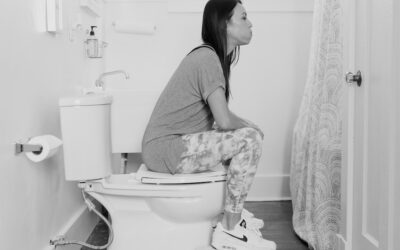If you have female reproductive organs, there’s a good chance you’ve experienced “What the heck is happening?!” symptoms here and there.
The symptoms of uterine fibroids definitely fall into that category.
So let’s talk about fibroids: What they are, how to know if you might have one, how they can affect your pelvic floor or sexual health, and how to manage them.
What are Fibroids?
Fibroids are non-cancerous growths made of smooth muscle cells and fibrous connective tissue. They can develop inside, outside, and around the uterus during our childbearing years.
According to UCLA Health, 70-80% of people with a uterus will develop a fibroid at some point in their lifetime. There are some factors that put you more at risk:
- Age, as fibroids are more common as we get older.
- Family history of fibroids.
- Ethnicity, with Black women being more likely to develop them.
- Lifestyle factors, like obesity, vitamin D deficiency, poor diet, and alcohol consumption.
Most people with fibroids don’t even know they have them! But other people experience common symptoms such as:
- Heavy or prolonged periods.
- Bleeding between periods.
- Pelvic pain and pressure.
- Painful intercourse.
- Difficulty getting pregnant.
And yes, fibroids can even cause back pain!
Most fibroids can be detected using minimally invasive tools, such as a standard ultrasound or MRI. Have a chat with your provider if you’re experiencing symptoms of fibroids to see what diagnostic method they recommend.
Fibroids and the Pelvic Floor
Fibroids vary significantly in size. Some fibroids are the size of a pea, while others are so large they distort and enlarge the uterus. It’s also possible to have many fibroids at once, further impacting the size and shape of the uterus.
Depending on how severe the fibroids are, they can put extra pressure on other pelvic floor organs like the bladder, colon, intestines, and rectum. This can cause additional symptoms like frequent urination and constipation.
Fibroids and Painful Sex
Can fibroids cause pain during sex? Absolutely.
Size and location are the most significant factors here. Larger fibroids can create constant pressure, both in the uterus and surrounding organs. Fibroids that grow near the cervix are also vulnerable to impact and pressure during sex, which can make vaginal penetration painful.
Fibroids can cause pelvic floor tension, too, which is one of the primary causes of pain during sexual intercourse. Ultimately, it’s a not-so-fun carousel–tension creates pain which creates tension which creates pain… and on it goes.
Fibroids can make sex uncomfortable in other ways, too.
- The irregular, longer, or more painful periods accompanying fibroids can make sex less enjoyable.
- Heavier periods can lead to anemia and fatigue, which can negatively affect libido.
- Hormonal imbalances underlying fibroids can cause vaginal dryness.
- Fibroids affecting the bladder or urethra can lead to urinary tract infections. (Sex + UTI = no thank you.)
- Larger fibroids can impact the shape of the abdomen, which can lead to a negative body image and decreased desire to get undressed.
Learn more about pelvic floor pain during sex.
6 Ways to Manage Fibroids
#1 Eat well.
Eating whole, unprocessed foods can help balance out hormones and keep us at a healthy weight (whatever that means for you). This can decrease the risk of fibroids.
#2 Manage stress.
Researchers are still investigating the relationship between stress and fibroid growth, but the initial research is suggesting a connection. Decreasing chronic stress can dramatically improve overall pelvic floor tension. The less stressed we feel, the more our muscles can relax! From practicing yoga to seeing a professional therapist, making small changes over time can help decrease toxic stress.
Read about the relationship between stress and pelvic floor tension.
#3 Practice diaphragmatic breathing.
Diaphragmatic breathing helps to calm the nervous system and reduce muscle guarding. It does this through good mobility, blood flow, and relaxation to the pelvic floor and abdomen.
Here’s how to do it:
- Place one hand on your chest and the other on your abdomen and relax your jaw and shoulders.
- As you slowly count to five, take a gentle breath, letting the abdomen and rib cage expand. Imagine you’re opening an umbrella inside your rib cage, starting at your diaphragm.
- Slowly count to five again as you exhale and let your chest and midsection relax downwards.
- Repeat five or more times.
You can practice diaphragmatic breathing anywhere: In line at Target, across the table from your in-laws, while you’re waiting in the school pick-up line, and more.
#4 Chat with your sexual partners.
Increased anxiety around sex can make things difficult. If we’re anticipating or experiencing pain, we’re more likely to tense up. Ultimately, this creates more pain!
One way to decrease this sex-related anxiety is to talk about it. (Seriously.) Discussing the tough stuff–like fears and frustrations around sex–is obviously hard. Starting in a neutral place outside the bedroom can help. You can do it!
#5 Prep for sex.
Fibroids and vaginal dryness often go hand-in-hand. To reduce friction, tearing, or rawness during intercourse, moisture is your BFF.
I recommend two water-based lubricants that rarely cause irritation– Slippery Stuff & Good Clean Love. These brands are also safe with latex and non-latex condoms. You can also use natural oils such as coconut oil. But remember, oil and latex don’t mix well, so if you use oil-based lubricant, avoid using a latex condom as it may tear.
CBD products can also be a game changer for pelvic pain. The CBD acts alongside the pelvic floor muscles to help them relax. There are different brands out there with different ingredients and amounts of CBD.
All-natural vulvar moisturizers are an option too. One of my favorites is Vmagic from Medicine Mama. You can use this hormone-free, oil-based vulvar balm daily to moisturize vulvar tissues and soothe irritation and dryness.
#6 Talk with your provider.
Your provider can talk you through all your fibroid treatment options. Over-the-counter medications, birth control, hormones, and other oral therapies can be non-invasive treatment options. Fibroids can also be removed surgically if needed.
Show your pelvic floor some love.
The pelvic tension and pressure from fibroids can be intense. You deserve relief.
Check out The V-Hive Relaxation Series for daily stretch routines and massage techniques to ease pelvic floor tension and fibroid symptoms. Try them completely free for a week here!





